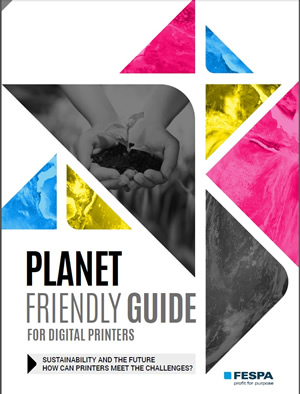Fespa encourages printers to adopt sustainable practices with the launch of 11 Planet Friendly mini guides
Fespa has re-launched its Planet Friendly Print Guide in the form of 11 new ‘mini’ guides as part of its wider Planet Friendly Print programme.
The Planet Friendly Print Guide, originally launched as a single publication in 2007, has now been redesigned as 11 individual guides, incorporating one introductory guide and 10 subject guides.
Sean Holt, general secretary at Fespa, explains the reasoning behind the re-launch, saying: “For the guides to be contemporary and up to date they must reflect the changes in legislation and best practice, which are continually evolving. We set out to review the original Planet Friendly Guide, which has been regularly updated since its launch, make the necessary modifications, and add fresh content to reflect new changes and regulations. What’s more, we recognised that the previous iteration only served some of the print community, so we decided to split the guides into 10 different topics, each addressing a specific environmental matter across wide-format screen and digital printing.”
The 10 subject guides look at:
• Sustainability and the future
• Pollution for screen printers
• Pollution for digital printers
• Hazardous substances
• Emissions to water
• Emissions to air for screen printers
• Emissions to air for digital printers
• Waste for screen printers
• Waste for digital printers
• Paper and other substrates
Holt adds: “For printers, many of whom are small owner- managed businesses, finding the time and headspace to tackle environmental practices can be a challenge. We wanted to help them by providing information in bite-size chunks so that they could look at different areas of their business and come up with environmental improvement plans that they could implement in a practical sense. Having 11 individual guides makes the content more digestible, for instance if a digital wide-format printer wants to know more about air emissions then there’s a guide for them and their print process.”
As the Planet Friendly Print Guides are considered an important benefit for the members of the Fespa associations, those belonging to Fespa UK will get the guides free of charge. Indeed, the guide has previously only been available to members of Fespa’s associations. However, mindful of the guides’ value in promoting understanding of key drivers for adopting sustainable practices, non-Fespa association members will now be able to buy the guides at www.fespa.com for 25 Euro each.
 According to Holt, it’s important that wide-format printers have access to environmental information that’s specific for them. For example, one of the main areas of discussion regularly cited surrounding environmental issues in print is paper and recycling. However, for wide-format printers, for whom paper isn’t a common substrate and more complex materials such as vinyl, plastic and textiles are more widely used, Fespa has provided a guide covering the separate legislations regarding non-paper substrates.
According to Holt, it’s important that wide-format printers have access to environmental information that’s specific for them. For example, one of the main areas of discussion regularly cited surrounding environmental issues in print is paper and recycling. However, for wide-format printers, for whom paper isn’t a common substrate and more complex materials such as vinyl, plastic and textiles are more widely used, Fespa has provided a guide covering the separate legislations regarding non-paper substrates.
The research and production of the Planet Friendly Guides is funded through Fespa’s Profit for Purpose reinvestment programme, which has seen millions of Euros reinvested in various initiatives to support the global print community.
With regulations and legislations regularly shifting, keeping up to date on the relevant and recent changes is a significant challenge. Fespa is fortunate enough to have the expert guidance of Michel Caza and Paul Machin, two well- respected voices in the industry with a wide breadth of knowledge relating to printing in an environmentally sustainable way.
Some would argue that the environment has dropped down the agenda in recent years. However, Fespa believes that it continues to be a key issue for printers seeking to grow and become more profitable. Holt continues: “From our perspective the environment is relevant regardless of economic conditions. Businesses that can demonstrate their environmental credentials offer added-value to their customers and the wider community. By printing responsibly and sustainably the industry can respond proactively to the challenges the environment faces, while also improving performance. Better environmental practices more often than not result in reduced waste, improved efficiency and operational cost savings.”
The 11 new guides form part of a wider Planet Friendly commitment from Fespa, and content from them will appear as part of the educational programme at Fespa 2015 in Cologne next May.
{jathumbnail off}


